Ukrainians endured a brutal barrage of drone and missile strikes targeting Kyiv and other cities across Ukraine on Monday. The attacks killed at least three people, wounded at least 13, and cut off electricity in parts of the country. One of those killed, Ryan Evans, was a 38-year-old British veteran security adviser working with Reuters, and two other members of the team had to be hospitalized, one with serious injuries.
Sadly, Ukrainians are accustomed to waking up to air raid sirens and no electricity. Regional officials swiftly moved to open “points of invincibility,” essentially shelters that can keep people safe from the bombs and also offer a chance to charge electronics and have a snack.
The big picture: Ukraine’s incursion into Russian territory near Kursk has spooked Moscow, which is struggling to push them back. Ukrainians have also launched daring drone raids deep into Russia, even targeting Moscow. Russia means to remind Ukraine it can still cause immense disruption with its long-range missiles.
And in the south, Russian forces are steadily advancing on the
key town of Pokrovsk, forcing civilians to evacuate. Taking the city would secure key roads Moscow needs to secure the Donetsk and Luhansk regions, which Russian President
Vladimir Putin has made a priority.
